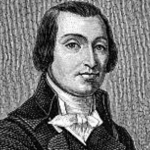 Pierre-Joseph Cambon (1756-1820) was a French merchant turned revolutionary politician and financier. Born in Montpellier in southern France, Joseph Cambon was the son of an affluent cotton and cloth manufacturer. He received a good education and later inherited his father’s firm, where he showed considerable business acumen. In 1789 Cambon travelled to the Estates-General as a reserve deputy for his city; he did not vote or participate in proceedings but remained as an observer. On his return to Montpellier, Cambon became a city councillor and established a local branch of the Jacobin club. A constitutional monarchist initially, Cambon was outraged by the flight to Varennes and by late summer 1791 was raising petitions for the formation of a republic. Cambon was elected to the Legislative Assembly, where his experience in business saw him elevated to the Assembly’s finance committee. In April and May 1792 he published three detailed reports on the state of France’s economy, finding it particularly dire.
Pierre-Joseph Cambon (1756-1820) was a French merchant turned revolutionary politician and financier. Born in Montpellier in southern France, Joseph Cambon was the son of an affluent cotton and cloth manufacturer. He received a good education and later inherited his father’s firm, where he showed considerable business acumen. In 1789 Cambon travelled to the Estates-General as a reserve deputy for his city; he did not vote or participate in proceedings but remained as an observer. On his return to Montpellier, Cambon became a city councillor and established a local branch of the Jacobin club. A constitutional monarchist initially, Cambon was outraged by the flight to Varennes and by late summer 1791 was raising petitions for the formation of a republic. Cambon was elected to the Legislative Assembly, where his experience in business saw him elevated to the Assembly’s finance committee. In April and May 1792 he published three detailed reports on the state of France’s economy, finding it particularly dire.
The declaration of revolutionary war in April 1792 placed more pressure on Cambon, by now the man most responsible for financing it. He did so by issuing more rounds of assignats while hurrying through legislation to seize property from émigrés, the nobility and the Catholic church. In September 1792, Cambon served briefly as the last president of the Legislative Assembly before moving to the National Convention, where he aligned himself with the Girondins. For the next two and a half years Cambon served as France’s virtual treasurer, drafting or approving almost every appropriation or financial measure. Through 1793 he worked to decrease the number of assignats in circulation, thus increasing their real value. Cambon consolidated all national debts into a Grand Livre de la Dette Publique (‘Great Book of Public Debt’). In September 1793 he forced wealthy French citizens to subscribe to a “Forced Loan”, a policy that eased national debt while pleasing the Jacobins.
Politically, Cambon remained a moderate republican. He voted for the execution of Louis XVI in January 1793 and served briefly on the first Committee of Public Safety. Cambon despised Robespierre, the Revolutionary Tribunals and the excesses of the Terror, however, but survived by concentrating only on fiscal matters. In July 1794 he voted for Robespierre’s overthrow and arrest, remaining in the Convention briefly before the Thermidorians forced him into hiding. Cambon returned to serve briefly in Napoleon‘s lower house but held no significant role in the government. He was forced into exile and spent the last years of his life living in what is now modern-day Belgium.
© Alpha History 2018. Content on this page may not be republished or distributed without permission. For more information please refer to our Terms of Use.
This page was written by Jennifer Llewellyn and Steve Thompson. To reference this page, use the following citation:
J. Llewellyn and S. Thompson, “Pierre-Joseph Cambon”, Alpha History, accessed [today’s date], https://alphahistory.com/frenchrevolution/pierre-joseph-cambon/.
